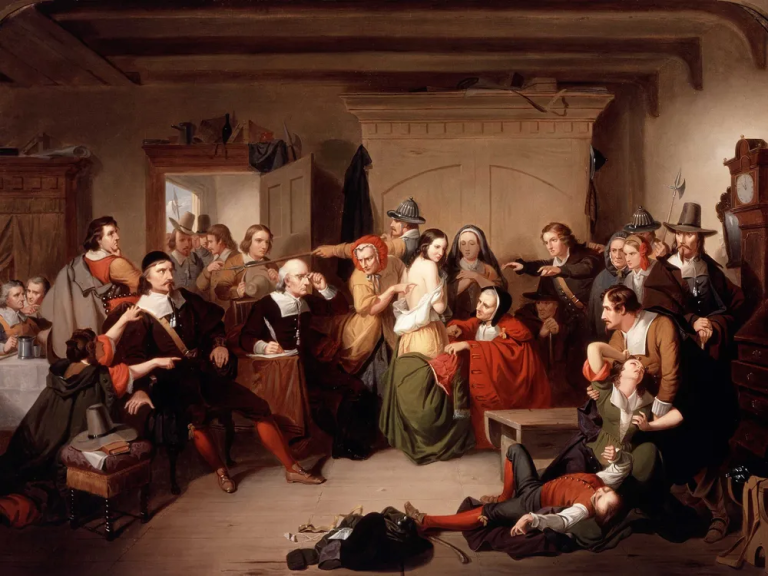
Painting: Examination of a Witch (1853) by T. H. Matteson, inspired by the Salem trials.
New York, N.Y. Voluntary indentured servitude in the early American Colonies was the prominent system of labor until replaced by slavery. Nearly half of total white immigration to the Thirteen Colonies came under indenture.
In 1638, at the age of 26, our ninth great-grandmother Frances Elizabeth Alcock left England on the ship Bevis as a servant to the Richard Dummer family. On that same ship, also hired as a servant, was John Enoch Hutchins, who would soon become her husband.
At the conclusion of their servitude, the young couple settled in Haverhill, Massachusetts where she raised ten children and he worked as a skilled carpenter. They must have done very well because they were probably the first family in Haverhill to have servants of their own (including an Indian woman named Hopewell).
In the summer of 1692, nineteen emigrants to Massachusetts were convicted of witchcraft and carted off to Gallows Hill, a barren slope near Salem village, for hanging. Another man of over eighty years was pressed to death under heavy stones for refusing to submit to the trials. This travesty of justice probably occurred in Salem due to an unfortunate combination of an ongoing frontier war, a poor economy, congregational strife, teenage boredom & personal jealousies.
On August 18, 1692, at the age of 80 (and seven years after her husband had died) Frances Alcock Hutchins was arrested for witchcraft as a result of a complaint filed by Timothy Swan, Ann Putnam & Mary Walcott. The charge was not pressed because her son Joseph and his wife’s brother-in-law Samuel Kingsbury posted “sufficient bond” – which I think must mean that they paid them off. The accusers’ complaint was that she “hath sorely afflicted them in their bodies by witchcraft Severall times Contrary to the Peace of our Soverigne Lord and Lady King William & Queen Mary of England & to the Majesties Law in the Case provided”.
Poor Frances spent four months in prison (which must have been wretched in the 1600s) and was finally released on the 21st of December. No record of a trial was ever found.
But, believe it or not, that was not Frances’ first brush with the law! In September of 1653, at the age of 41, Frances and her friend Mrs. Joseph Swett were arrested in Haverhill for disobeying a law that had been passed 3 years earlier prohibiting the display of finery for persons whose property was valued under £200. Frances was arrested for wearing a silk hood but, while she was acquitted because she had been brought up “above the ordinary rank”, her friend Mrs. Swett was found guilty and made to pay 10 shillings.
So, be very glad that you were not born in Massachusetts in the 1600s.
Our Ancestor Frances Elizabeth Alcock and The Salem Witches Trial (May 8, 2020)
This column, written by several including Molly Luce Larkin, focuses on American history through the eyes of one family. In 2010, Jim Luce wrote in the Huffington Post, Mayflower Roots – and a Metrocard – Get One on the Subway. In this piece, he began to explore the impact of Brahmin roots in today’s American soil. Most families, as ours, had both heroes and horse thieves. We cannot change the past, but we can report and reflect upon it.
See: “Our America” – Exploring U.S. History through Family’s Eye